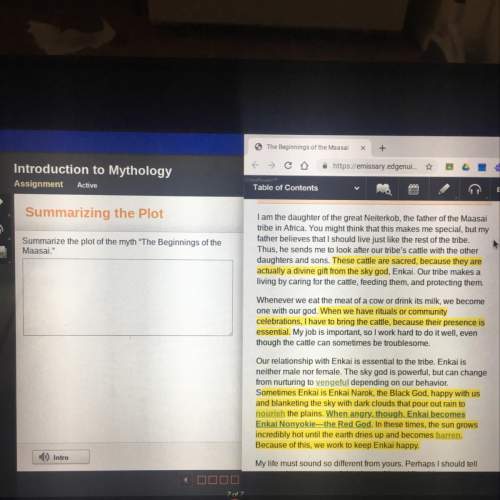
English, 11.03.2020 21:34 TrapQueen665
1) I first learned about the transforming power of education from stories about my paternal grandfather. Granddaddy Rice was a poor farmer’s son in Ewtah, Alabama. One day, he decided to get book-learning. And so he asked, in the language of the day, where a colored man could go to school. They said that a little Presbyterian school, Stillman College, was only about 50 miles away. So he saved up his cotton to pay for the first year’s tuition. After the first year, he ran out of cotton and he needed a way to pay. Granddaddy asked the school administrators how those other boys were staying in school, and he was told that they had what was called a scholarship. And, they said, “if you wanted to be a Presbyterian minister, you could have a scholarship too.” My grandfather said, “That’s just what I had in mind.”
(2) Despite all my grandfather had to endure—including poverty and segregation—he understood that education is a privilege. And with privilege comes responsibility.
(3) The first responsibility of the educated person is to be optimistic. Cynicism and pessimism are too often the companions of learning. There have indeed been dark chapters in the human story—and the more we learn about history’s failures and cruelties, the more our minds can be tempted to despair. But for allof our problems today, and by just about every measure, the world is a better, more hopeful place than it ever has been.
(4) The advances that have been made during your lifetimes alone—from breakthroughs in health care, to the spread of prosperity, to the progress of democracy—have been pushed by optimists, not pessimists. America’s founders were not pessimists. Nor were the Wright Brothers, or Jonas Salk, or Martin Luther King.* Nor is any man or woman of real accomplishment. The reason is simple—pessimism is the easy way out. It is characteristic of those content to stand on the side lines and watch the march of history. Optimism requires work.
(5) It requires examination and objective thought. Optimists move and shape history because those with avision of a better world have the energy and discipline required to make those visions real. With all that you now know, you have no excuse not to be optimists. You should know that progress is not only possible, but an unfolding story in which you have an obligation to play a part. Which of the following sentences from the speech appeals most directly to reason?
A. I first learned about the transforming power of education from stories about my paternal grandfather. (paragraph 1)
B. My grandfather said, "That's just what I had in mind." (paragraph 1)
C. Cynicism and pessismism are too often the companions of learning. (paragraph 3)
D. Optimists move and shape history because those with a vision of a better world have the energy and discipline required to make those visions real. (paragraph 5)

Answers: 3
Another question on English

English, 21.06.2019 18:00
Write a syllogism in the space provided below. if written for me, you will receive 40
Answers: 1

English, 22.06.2019 02:00
I’m robert frost poem “mending wall”, what does the narrator have on his side of the wall? a. a pine forest b. a cow farm c. an apple orchard d. a rabbit nursery
Answers: 2

English, 22.06.2019 02:10
For the strangers that came to town you will write a paragraph explaining the main conflict. you will also compare and contrast the perspectives of the protagonist and antagonist. view the grading rubric as you complete your assignment. this is your guide to a super submission. for this assignment, use the novel or short story you chose to read for module 5. write a paragraph explaining the conflict and the perspectives of the protagonist and antagonist. review the example in the lesson. be sure your paragraph mentions the title and author in the first sentence briefly summarizes the plot identifies the main conflict describes the protagonist’s perspective on the conflict provides a line of dialogue that the protagonist says to support your idea (text support) describes the antagonist’s perspective of the conflict provide a line of dialogue that the antagonist says to support your idea (text support) includes a closing line to summarize the character’s views uses correct grammar, punctuation, and spelling
Answers: 1

English, 22.06.2019 05:40
Which character shows external character development in the crucible
Answers: 1
You know the right answer?
1) I first learned about the transforming power of education from stories about my paternal grandfat...
Questions

Mathematics, 09.07.2019 19:00



Mathematics, 09.07.2019 19:00

Arts, 09.07.2019 19:00





Mathematics, 09.07.2019 19:00

Mathematics, 09.07.2019 19:00

Mathematics, 09.07.2019 19:00


Mathematics, 09.07.2019 19:00

Biology, 09.07.2019 19:00



Mathematics, 09.07.2019 19:00

History, 09.07.2019 19:00




